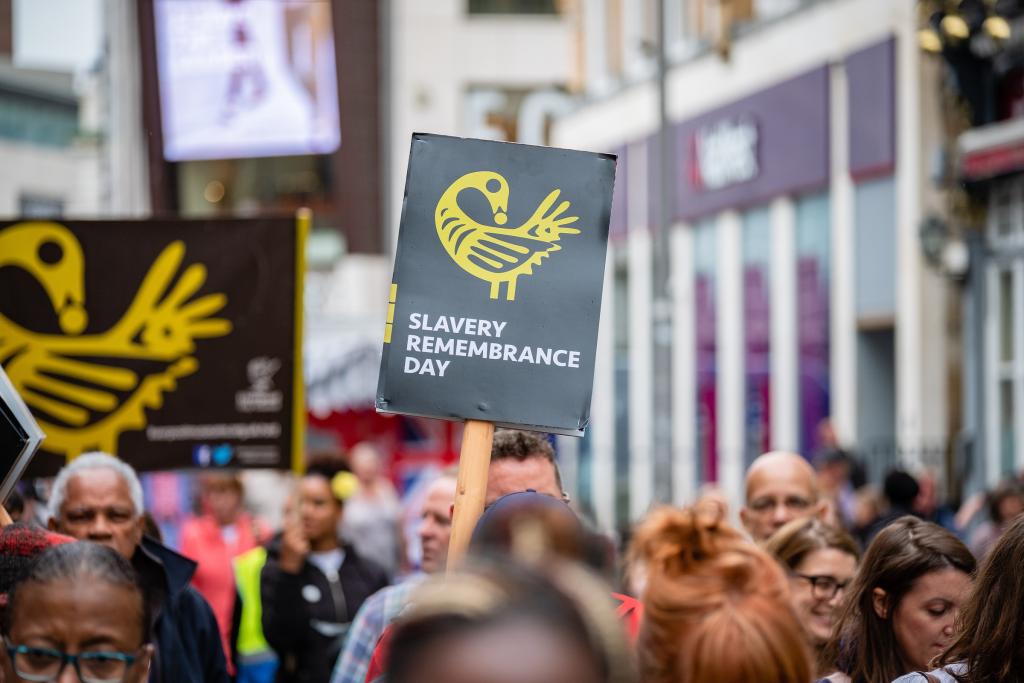Spotlight on: Slavery Remembrance Day

Slavery Remembrance Day takes place on 23 August, a date chosen by UNESCO to commemorate a significant uprising of enslaved African people on the island of Saint-Domingue (modern Haiti) in 1791. This event was instrumental in the long fight for abolition and catalysed the downfall of the transatlantic slave trade.
Liverpool has been at the forefront of Slavery Remembrance Day commemorations since they began in 1999, paying homage to the many lives lost and reflecting on the city’s once pivotal role as one of Europe's main slaving ports.
The day also celebrates the survival and growth of African and Caribbean cultures, with free events and activities to remember and celebrate this key date in history. From marches through the city, to symbolic libations into the River Mersey, festive commemorations activate the city.

Liverpool’s first Slavery Remembrance Day welcomed the late MP Bernie Grant who unveiled a plaque at the historic Canning Dock, a place where slave ships were once fitted out and repaired. Born in British Guiana (now Guyana), Grant was a trade unionist who became leader of Haringey Council in 1985, and the first Black person to hold such a role in Europe.

In 2007 - the bicentenary of the abolition of the British slave trade - the International Slavery Museum (ISM) was first opened. Located in Liverpool’s historic Royal Albert Dock, ISM highlights the international impact of slavery, both in a historic and contemporary context, whilst actively campaigning and challenging the legacies of that involvement such as racism and discrimination in Liverpool and beyond. Over the years, ISM would play an integral part of Slavery Remembrance Day activities.
The Dorothy Kuya Memorial Lecture has hosted many esteemed speakers, educators and activists. A roll call of inspiring guests have included civil rights campaigner Mr Martin Luther King III, award-winning film director Amma Asante, renowned activist and scholar Dr Maulana Karenga, civil rights campaigner Diane Nash, Zimbabwe's first Black cricketer Henry Olonga, poet Lemn Sissay, author and musician Akala, and historian David Olusoga, amongst many more.
Virtual Commemorations
In 2020, the programme took place online due to the global pandemic. Following the murder of George Floyd by American police officers, the vast reach and profound importance of the global Black Lives Matter movement saw an accelerated change in awareness towards racism. At the same time, the COVID-19 pandemic isolated many communities and had a disproportionate effect on those of the Global Ethnic Majority. With so much unrest and uncertainty in the world, it was vital for communities to come together, albeit virtually, to remember and reflect on the past, and work together for the future.
It was key for us to continue with this most important annual event and even though we might not be together in person, we are collectively together virtually. We will still remember the ancestors, their sacrifices, their resilience and their knowledge.
- Dr Richard Benjamin, former Head of the International Slavery Museum

Slavery Remembrance Day is a vital event not only for the International Slavery Museum but for Liverpool and the country as a whole. It not only commemorates the lives and deaths of millions of Africans enslaved during the period of the transatlantic slave trade, but recognises their resilience and resistance too.
